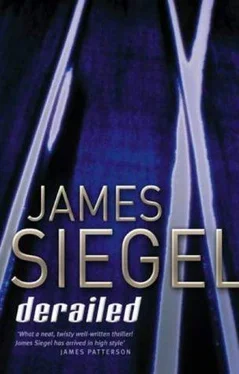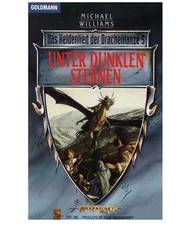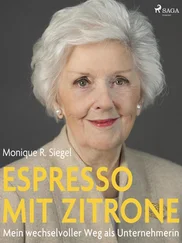“I don’t know what he wanted.”
“Well, what did he say? Did he — ”
“He asked me how he was.”
“How he was? I don’t — ”
“Did I enjoy it? He wanted to know if I enjoyed it. He wanted affirmation — isn’t that what men ask you after they . . .” But she couldn’t bring herself to finish the sentence. I guess even false bravado has its limits.
“I’m sorry, Lucinda.”
Another apology. I had the feeling I could apologize to her every day for the rest of my life, then keep on apologizing to her into the afterlife, and it still wouldn’t be enough. And then I’d have all those other people to apologize to as well.
“I think he wanted to know . . . ,” she said.
It suddenly occurred to me that I was speaking louder than I should’ve been. Either louder or softer — because I was drawing glances from the sparsely filled train — from the woman surrounded by Bloomingdale’s shopping bags sitting across from me and the two girls with nose earrings holding hands on the other side of the aisle.
“What did he want to know?” I asked.
“Whether we’d done anything. Gone to the police. . . .”
We won’t go to the police, I'd promised him. The kind of promise most victims of violent crime probably make in the heat of terror. Only in this case, a promise Vasquez could more or less believe if he chose to. This woman don’t look like you, he’d said to Lucinda. And this man — he don’t look like you.
Vasquez might’ve jumped anybody this morning. But he’d gotten lucky. He’d found the perfect victims. Because we had to hide the fact we were victims.
“What do we do now?” Lucinda asked me now, the same question I’d asked her back in the hotel room. Because suddenly nothing wasn’t enough. Not anymore.
“I don’t know.”
“Charles . . .”
“Yes?”
“What if he . . .”
“Yes?”
“Never mind.”
“What if he what, Lucinda?” But I think I knew what she was going to ask me. I just didn’t wish to hear it said out loud — not now, not yet.
“Okay, so what do we do, Charles?”
“Maybe what we should’ve done before. Maybe we have to go to the police.”
“I’m not telling my husband.”
She’d gotten real emotion back in her voice after all. A sudden and undeniable firmness that brooked no further discussion. “If I can manage it, then you can." I was the one raped, she was saying to me. I was the one raped six times while you sat there and did nothing. If I can choose to be quiet about it, then you can. Then you have to.
“Okay,” I said. “Okay. If he calls again, I’ll talk to him. I’ll find out what he wants.”
Deanna mothered me when I got home. So did Anna — maybe she was finally happy to see someone else in need of medical attention. She brought me a warm compress to lay against my swollen nose and gently rubbed my arm as I lay half-dead on the bed.
I was back in the bosom of my family — content, grateful, the very picture of domestic bliss.
Except each time the telephone rang, I flinched as if punched in the stomach.
A friend of Deanna’s. A mortgage broker’s cold call. My secretary wanting to know if I was all right.
But there was always the next call, wasn’t there?
And they insisted on hearing about the accident. Anna wanted to know how I could have been so spastic. Stepping out of a cab, for God’s sake. Into a hole?
I said I didn’t want to talk about it. And I wondered if repeating the same lie was the same as telling different lies. If one was worse than the other. Neither one felt particularly good, not when my daughter was offering me a warm towel and my wife her unconditional love.
I tried to watch some basketball in the den, to root for the struggling Knicks. But I found it hard to focus; my mind kept wandering. There was a player on the Indiana Pacers, for instance, who looked a little like . . . Black, but Hispanic. Lopez, his name was — a backup guard. Taller of course, but . . .
“What’s the score?” Anna asked me. She’d stopped watching basketball with me at age nine, but I supposed she was trying to be kind to her bruised and battered father.
“We’re losing.” It was a safe answer these days, even if you didn’t actually know what the score was.
Just then it turned up in the left corner of the screen. The Knicks had rallied within four.
“Eighty-six to eighty-two,” Anna recited.
“A close one,” I said. “We’ve got a shot.”
“Daddy?”
“Yes?”
“Daddy — did you ever play basketball?”
“Sure.”
“On a team? ”
“No. Not on a team.”
“Then how’d you play?”
“With friends. At the park — you know.” Murray Miller, Brian Timinsky, Billy Seiden. They were my best friends growing up — but slowly, one by one, they’d faded away. Years ago, I’d seen Billy Seiden in a Pathmark supermarket, but I’d left without saying hello.
I hugged Anna. I wanted to tell her something, about love and life and how it can be fleeting if you don’t hold on — that you have to jealously guard what’s important to you — but I couldn’t think of the right words.
Because the phone rang.
Anna picked it up after the second ring.
“For you, ” she said.
“Who is it?”
“Some Spanish guy,” Anna said.
THIRTEEN
The conversation:
“Hello there, Charles. ”
“Hello.” His voice seemed out of context. It belonged in a hotel room smelling of blood, not here in the safety of my own den. Unless my den wasn’t safe anymore.
“How’s things, Charles? ”
“What do you want?”
“You doin’ okay, Charles?”
“Fine. What do you want?”
“You sure you doin’ okay, Charles?”
“Yes, I’m doing okay.”
“Not getting stupid on me, Charles, right? Not running to the cops?”
Lucinda was right; he wanted to know if we’d gone to the police. “No,” I said.
“I know you promised and all, but I don’t know you that well, know what I’m sayin’?”
“I haven’t gone to the police,” I said. I was speaking softly; I’d ushered Anna out of the room, but that didn’t mean she wouldn’t come in again. And then there was Deanna, who just might pick up the phone and wonder who I was talking to.
“That’s good, Charles.”
“What do you want?” I asked him again.
“What do I want?”
“Look, I — ”
“You’re not going to get stupid on me, Charles, right? You tell the cops, you got to tell the little woman, right, Charles? You got to tell her how you’re fucking Lucinda, right, Charles? Why you want to do that, huh?”
He’d laid it out for me. The crux of the situation, just in case I’d missed it.
“I’m not going to the police,” I repeated.
“That’s good, Charles. Here’s the thing — I need a loan.”
Okay. It was the question Lucinda had begun to ask me on the phone. What if he . . . Not exactly finishing, but if she had, she would have said: What if he asks for money?
“I hate to ask, know what I mean?” he said. “But I’m a little short, see.”
“Look, I don’t know what you think — ”
“Not much, Charles. A little loan, you know. Say ten grand. . . .”
“I don’t have ten grand.”
“You don’t have ten grand?”
“No.” I’d thought it was over, but it wasn’t over.
“Shit. That’s a problem.”
“Look, I don’t have cash just lying around like that. Everything’s — ”
Читать дальше












